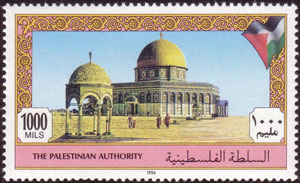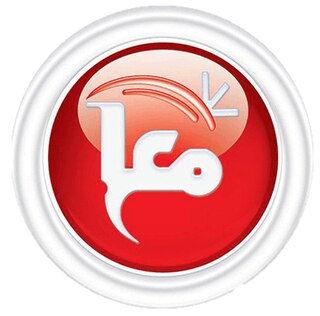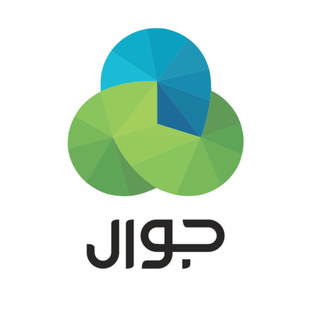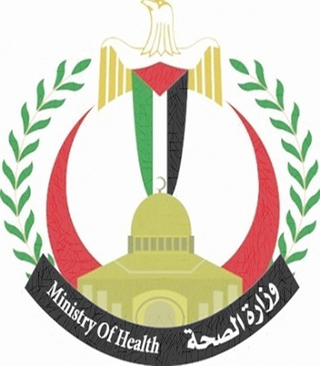
The Gaza Strip, also known simply as Gaza, is a small territory located on the eastern coast of the Mediterranean Sea; it is the smaller of the two Palestinian territories, the other being the West Bank, that make up the State of Palestine. Inhabited by mostly Palestinian refugees and their descendants, Gaza is one of the most densely populated territories in the world. An end of 2024 estimate puts the population of the Strip at 2.1 million. Gaza is bordered by Egypt on the southwest and Israel on the east and north. The territory has been under Israeli occupation since 1967.

The West Bank, so called due to its location relative to the Jordan River, is the larger of the two Palestinian territories that comprise the State of Palestine. A landlocked territory near the coast of the Mediterranean Sea in the Levant region of West Asia, it is bordered by Jordan and the Dead Sea to the east and by Israel to the south, west, and north. Since 1967, the territory has been under Israeli occupation, which has been regarded illegal under the law of the international community.

Palestine, officially the State of Palestine, is a country in the southern Levant region of West Asia recognized by 146 out of 193 UN member states. It encompasses the Israeli-occupied West Bank, including East Jerusalem, and the Gaza Strip, collectively known as the occupied Palestinian territories, within the broader geographic and historical Palestine region. Palestine shares most of its borders with Israel, and it borders Jordan to the east and Egypt to the southwest. It has a total land area of 6,020 square kilometres (2,320 sq mi) while its population exceeds five million people. Its proclaimed capital is Jerusalem, while Ramallah serves as its administrative center. Gaza City was its largest city prior to evacuations in 2023.

The economy of the State of Palestine refers to the economic activity of the State of Palestine. Palestine receives substantial financial aid from various international donors, including governments and international organizations. In 2020, the inflation rate of -0.7% and unemployment rate was 25.9%. While exports were recorded at US$1 billion, with an import value of US$6 billion. Contributors to the national economy is service sector (47%), wholesale and repair (19%), manufacturing (12%), agriculture (7%), finance and banking (3%), construction (5%), information technology (5%) and transportation sector (2%).

This article describes transport in the State of Palestine, which consists of two non-contiguous territories, the West Bank and the Gaza Strip, different parts of which are administered by Palestinian National Authority, Hamas Administration in Gaza and Israel.

The country calling code +970 is reserved for telephone numbers in the State of Palestine.

The Palestinian Preventive Security, also known as Preventive Security Force (PSF), Preventive Security Service (PSS), is one of the security organs of the State of Palestine. It was established in 1994 by president Yasser Arafat in accordance with the Oslo Accords.

The Palestinian National Authority began in 1994 to issue stamps and operate postal services as authorized by the Oslo Accords.

The following outline is provided as an overview of and topical guide to the State of Palestine:

Palestine Telecommunications (Paltel) Company, listed in the Palestine Exchange (PEX) as Paltel, is a Palestinian telecommunications holding company based in Ramallah, Palestine. It consists of Palestine Telecommunications (Paltel), Palestine Cellular Communications Ltd, internet provide Hadara, Reach call center, and Palmedia broadcast media.

Ma'an News Agency is a large wire service created in 2005 in the Palestinian territories. It is part of the Ma'an Network, a non-governmental organization media network created in 2002 in the Palestinian territories among independent journalists throughout the West Bank and Gaza Strip. It has partnerships with eight local television stations and twelve local radio stations. Ma'an News Agency publishes news 24 hours a day in Arabic, Hebrew and English, and claims to be one of the largest wire services in the Palestinian territories, with over three million visits per month. Ma'an News Agency also publishes feature stories, analysis and opinion articles. The agency's headquarters are based in Bethlehem and it has an office in Gaza.
The water resources of Palestine are de facto fully controlled by Israel, and the division of groundwater is subject to provisions in the Oslo II Accord.

Palestine Cellular Communications Company, trading as Jawwal, is a Palestinian communications company providing cellular and wireless communications. Jawwal operates in the West Bank and Gaza Strip as part of Paltel Group.

Brazil–Palestine relations are the current and historical bilateral relations between Brazil and Palestine. On 5 December 2010, Brazil officially recognized the State of Palestine including all of the West Bank and the Gaza Strip. In 2015, the Embassy of the State of Palestine to Brazil was opened in Brasília, and the Brazilian government received an area in Ramallah for installing its diplomatic mission to Palestine.

Healthcare in the State of Palestine refers to the governmental and private healthcare providers to which residents in the claimed territory have access. Since 1967, there have been improvements in the access to healthcare and the overall general health conditions for residents. Advances in training, increased access to state-of-the-art medical technology, and various governmental provisions have allowed per-capita funding to increase, and therefore the overall health of residents in the region to increase. Additionally, the enhanced access to and funding from international organizations like the World Health Organization, the United Nations, the Palestinian Ministry of Health, and the World Bank Education and Health Rehabilitation Project have contributed to the current state of affairs within the healthcare segment of the Palestinian territories.

Hamas has governed the Gaza Strip in Palestine since its takeover of the region from rival party Fatah in June 2007. Hamas' government was led by Ismail Haniyeh from 2007 until February 2017, when Haniyeh was replaced as leader of Hamas in the Gaza Strip by Yahya Sinwar. Until October 2024, Yahya Sinwar was the leader of Hamas in the Gaza Strip. In January 2024, due to the ongoing Israel–Hamas war, Israel said that Hamas lost control of most of the northern part of the Gaza Strip. In May 2024, Hamas regrouped in the north.

Jordan–Palestine relations are strong, historical, bilateral relations.

Palestine–Spain relations are the bilateral and diplomatic relations between these two countries. Palestine has an embassy in Madrid. Spain has a consulate general in East Jerusalem that serves the West Bank, Gaza and Jerusalem. Spain recognised the state of Palestine on 28 May 2024.
Ibrahim Kharman is a Palestinian businessman. He is the Deputy CEO of the Palestine Telecommunications Group (Paltel) and the Chief Commercial Officer of Paltel Group. The Palestinian Communications Group is a public shareholding company established in 1995 in the Palestinian Autonomous Areas of the Palestinian National Authority It is the largest employer in Palestine.













